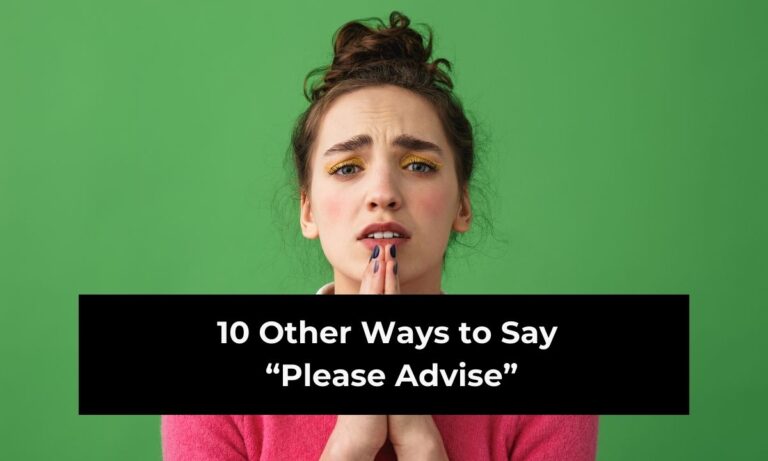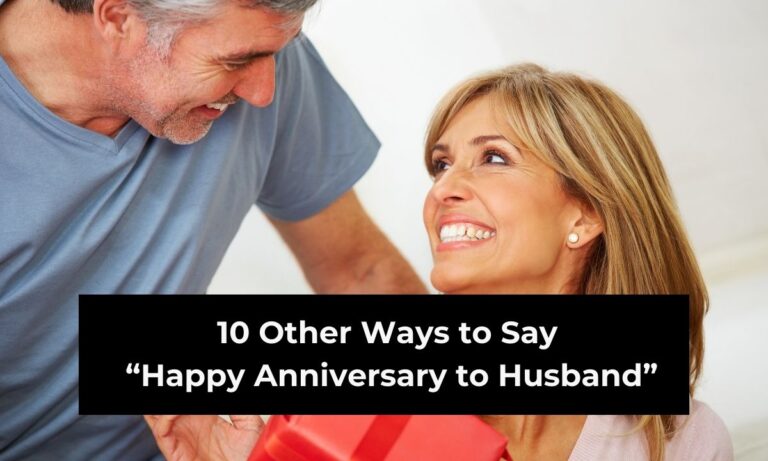When someone shares good news with you, your first instinct is to smile, feel happy, and say, “Thank you for the good news.”
But sometimes, you might want to respond in a way that feels more personal, heartfelt, or creative. After all, the words you choose can make the other person feel even more appreciated and valued. Whether it’s a friend telling you they got a promotion, a family member announcing exciting life updates, or a colleague sharing a project success, your response matters.
Using the same phrase over and over can feel repetitive. By finding other ways to express gratitude, you not only keep the conversation fresh but also deepen your connection with the person sharing the news. A thoughtful acknowledgment shows that you’re truly listening and that their effort in keeping you informed means something to you.

In this guide, we’ll explore 12 different ways to say “thank you for the good news” that are warm, sincere, and adaptable to different situations. Each one comes with a bit of explanation and examples so you can use them naturally in your daily life.
Must Read:
- Other Ways to Say “Thank You for Confirming”
- Other Ways to Say “Thank You for Your Support”
- Other Ways to Say “Thank You for the Warm Welcome”
By the end of this article, you’ll have a go-to collection of responses that make people feel special, while also allowing you to express yourself in a more genuine and memorable way.
1. “That Just Made My Day”
Sometimes, good news hits you in a way that instantly lifts your mood. Saying “That just made my day” tells the other person that their news had a positive impact on you.
This phrase works well when the news is exciting, unexpected, or personally meaningful. It’s not just about thanking them — it’s about showing how much it matters to you emotionally.
For example, if a friend tells you they’re visiting soon, you could respond with, “That just made my day! I’ve been looking forward to this.” This kind of reply combines gratitude and enthusiasm in one short sentence.
When you use this phrase, try to follow it with a small detail about why the news means so much. This makes the conversation warmer and more personal. Instead of simply acknowledging the information, you’re letting them know it had a real effect on your mood.
It’s perfect for informal settings with friends, family, and close colleagues. The tone is casual but heartfelt — which makes it ideal for moments when you want to sound genuinely touched.
2. “I Really Appreciate You Sharing This”
This response focuses on the effort the other person made to tell you the news. It’s a great way to show gratitude for both the message and the messenger.
By saying “I really appreciate you sharing this,” you make it clear that their thoughtfulness means a lot to you. It works well in professional settings, where you want to maintain a respectful tone while still expressing genuine thanks.
For example, if a coworker tells you that your proposal was approved, you might say, “I really appreciate you sharing this with me so quickly.” This adds a professional polish to your gratitude.
This phrase can also be paired with a short follow-up statement, like “It helps me plan my next steps” or “It means a lot to stay in the loop.” That way, you’re acknowledging not just the news, but the value it brings to you.
The beauty of this expression is its versatility — you can use it in personal conversations, emails, or formal letters without it sounding out of place.
3. “That’s Wonderful to Hear”
This phrase is warm, uplifting, and works in almost any context. It’s especially effective when the news has a joyful or positive tone.
When you say, “That’s wonderful to hear,” you’re giving more than just thanks — you’re affirming that the news itself is something worth celebrating. It’s a polite yet friendly way to react.
For example, if a family member shares that their medical test results came back clear, you might say, “That’s wonderful to hear! I’m so relieved and happy for you.” Adding a personal touch after the phrase makes your response more meaningful.
It’s an especially good choice for situations where you want to remain kind, caring, and empathetic. The tone is versatile enough for personal, professional, or even formal conversations.
You can use it in writing as well — it works beautifully in thank-you notes or professional emails where you want to acknowledge good news without sounding overly casual.
4. “I’m So Glad You Told Me”
This is a perfect phrase for moments when you want to show that you value being kept informed. It’s a mix of gratitude and appreciation for the relationship itself.
“I’m so glad you told me” can work in both personal and professional settings. It conveys that the news itself is good, but what matters even more is that the person thought of you when sharing it.
For instance, if a friend shares that a mutual acquaintance just got engaged, you might say, “I’m so glad you told me! I wouldn’t have wanted to miss that.”
You can make this phrase even warmer by following it with a short reaction about the news. That way, you’re not just thanking them — you’re also engaging with the content of the conversation.
This kind of response makes the other person feel that their effort to communicate with you was worth it. It’s not just about the news, but about maintaining trust and closeness.
5. “That’s Such a Relief”
Sometimes, the good news you receive is tied to a situation that caused worry or stress. In these cases, “That’s such a relief” perfectly captures your gratitude and emotional release.
If you’ve been waiting on test results, project approvals, or important decisions, this phrase shows you were invested in the outcome. It’s a way of saying thank you while acknowledging the emotional weight lifted by the news.
For example, if a coworker tells you that the client has approved your proposal, you could say, “That’s such a relief — I’ve been hoping for this all week. Thanks for letting me know.”
The phrase is especially powerful when paired with an acknowledgment of the other person’s role in sharing it. A simple “I really appreciate you telling me” afterward makes it even more heartfelt.
It’s best suited for moments when the news brings closure, comfort, or peace of mind.
6. “That Means a Lot to Me”
This is a deeply personal way to express thanks. It tells the other person that the good news isn’t just nice to hear — it’s genuinely important to you.
“That means a lot to me” works beautifully in emotional moments, such as hearing that a loved one is safe, that an opportunity came through, or that something you’ve been hoping for is now reality.
For example, if a friend tells you they defended you in a meeting, you might say, “That means a lot to me. Thank you for telling me.”
The phrase works in both spoken and written form. You can use it in text messages, heartfelt notes, or even professional emails when the context calls for a touch of emotion.
By using this phrase, you make your gratitude feel personal and connected — not just polite.
7. “I’m Thrilled to Hear That”
This is a lively, enthusiastic way to respond when the good news is truly exciting. It’s more expressive than simply saying “thank you” and helps share in the other person’s joy.
When you say, “I’m thrilled to hear that,” you’re matching their excitement level, which helps strengthen the emotional connection between you.
For example, if a friend tells you they’re moving to your city, you might say, “I’m thrilled to hear that! We’ll finally get to spend more time together.”
This phrase works well in personal and professional contexts when you want to convey high energy and genuine excitement. It’s especially fitting for moments when the news aligns with something you’ve been hoping for or looking forward to.
Adding a short follow-up — like why the news excites you — makes your response even more memorable.
8. “That’s Music to My Ears”
This idiomatic phrase is playful, warm, and full of personality. It’s perfect when the good news truly delights you.
Saying “That’s music to my ears” shows that you’re savoring the news, much like enjoying a favorite song. It’s a creative alternative that stands out in conversation.
For example, if a colleague says a challenging deadline was extended, you might say, “That’s music to my ears — now we can really focus on doing it right.”
It’s best used in casual or semi-casual conversations, as the tone is lighthearted. You can follow it with a quick thank-you if you want to add more formality.
This phrase works especially well when you want your reaction to feel unique and full of character.
9. “I’m Grateful You Shared This”
This is a sincere, slightly formal way to express thanks, especially suitable for professional or respectful settings.
By saying “I’m grateful you shared this,” you’re acknowledging the value of both the information and the act of sharing it. It shows maturity, professionalism, and kindness.
For example, if a manager informs you that your work has been recognized by leadership, you could respond, “I’m grateful you shared this — it’s encouraging to know.”
It works beautifully in emails, thank-you cards, and verbal conversations where you want to balance warmth with professionalism. This phrase is ideal for showing appreciation without sounding overly casual.
10. “That’s Amazing News”
When you want to respond with straightforward excitement, “That’s amazing news” is simple, clear, and effective.
This phrase works well for both personal and professional situations. It’s a natural choice when the news is overwhelmingly positive.
For example, if a family member tells you their long-awaited trip is booked, you could say, “That’s amazing news! You must be so excited.”
You can also use it as an opening line before adding a personal sentiment or congratulations. This makes your response feel more thoughtful and less generic.
11. “You Just Made My Week”
If “That just made my day” isn’t enough to capture how big the news feels, you can take it up a notch with “You just made my week.”
This phrase works when the news is so good that it changes the tone of your entire week for the better. It’s casual, fun, and heartfelt.
For example, if a close friend tells you a piece of news you’ve been hoping to hear, you might respond, “You just made my week. I can’t stop smiling.”
It’s perfect for personal moments, especially when you want the other person to feel how deeply their news has affected you.
12. “I Can’t Thank You Enough”
When regular thanks just don’t seem like enough, “I can’t thank you enough” captures the depth of your appreciation.
This phrase works for moments when the news is meaningful, emotional, or a big relief. It’s heartfelt and can be paired with a follow-up sentence explaining why it matters so much.
For example, if a friend tells you about an opportunity that changes your situation for the better, you might say, “I can’t thank you enough for telling me — it really means the world.”
It’s ideal for moments when your gratitude is overflowing and you want to make that clear.
Conclusion
Finding the right words to respond to good news can make your interactions warmer, more personal, and more memorable. While “thank you for the good news” is polite and clear, it doesn’t always capture the emotional depth or enthusiasm you might want to express.
By using alternatives like “That just made my day,” “I really appreciate you sharing this,” or “That’s music to my ears,” you can tailor your response to the situation and the person. Some phrases work better in professional settings, while others shine in casual conversations with friends and family.
The key is to match your tone with the emotion of the news — whether it’s relief, excitement, gratitude, or joy. This not only shows that you’re listening, but also that you care enough to respond in a thoughtful way.
With these 12 alternatives in your back pocket, you’ll never run out of warm, genuine ways to acknowledge and appreciate good news.
FAQs
1. Why should I use different ways to say “thank you for the good news”?
Using varied expressions keeps your communication fresh and personal. It also allows you to match your response to the tone and importance of the news.
2. Which phrases are best for professional settings?
Phrases like “I really appreciate you sharing this,” “I’m grateful you shared this,” and “That’s wonderful to hear” work best in professional or formal situations.
3. Can I use these phrases in emails?
Yes. Many of these alternatives work perfectly in writing, especially if you want to sound both warm and professional.
4. How do I make my response more personal?
Add a short follow-up about why the news matters to you or how it will affect your plans. This makes your gratitude feel more genuine.
5. Are these phrases suitable for text messages?
Absolutely. Most of them can be used in casual chats, texts, or social media replies, depending on the relationship you have with the person.





